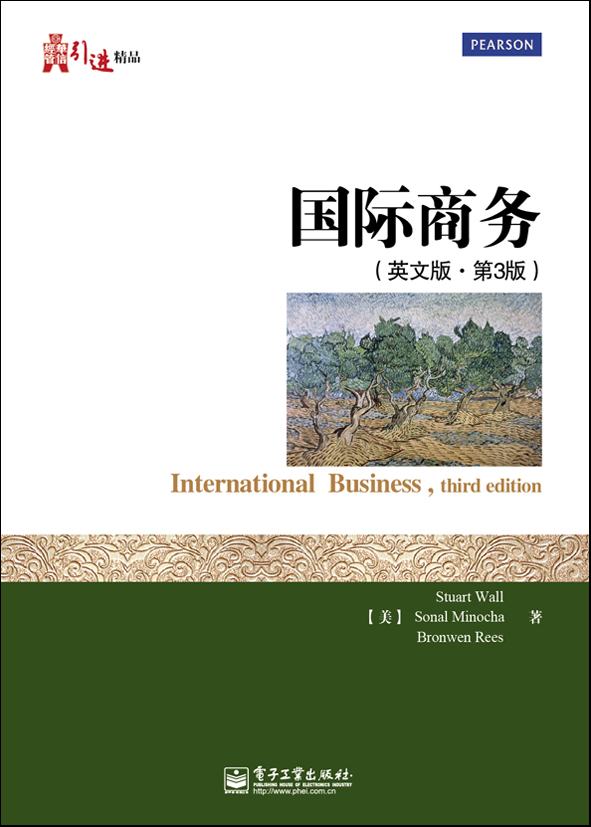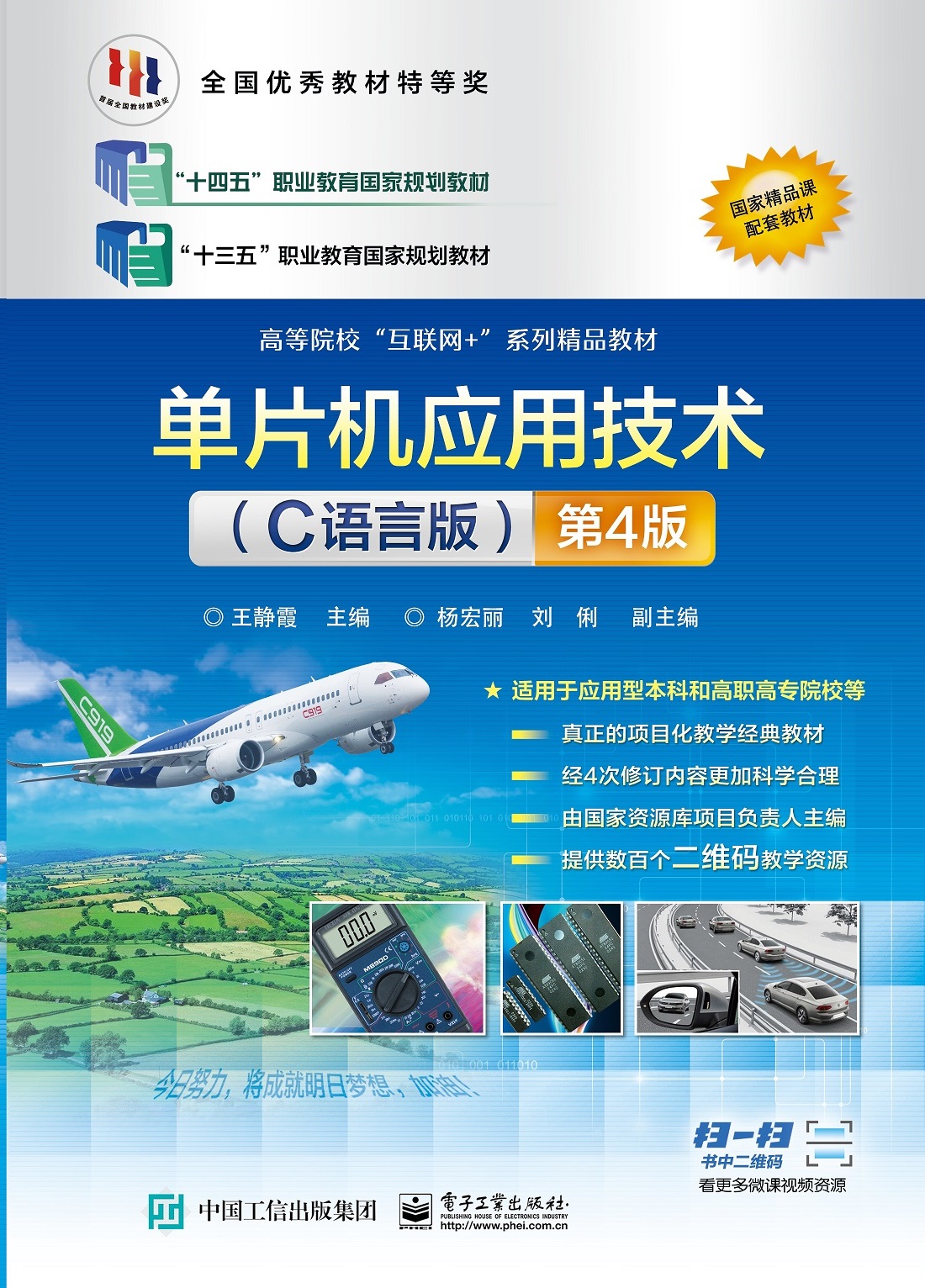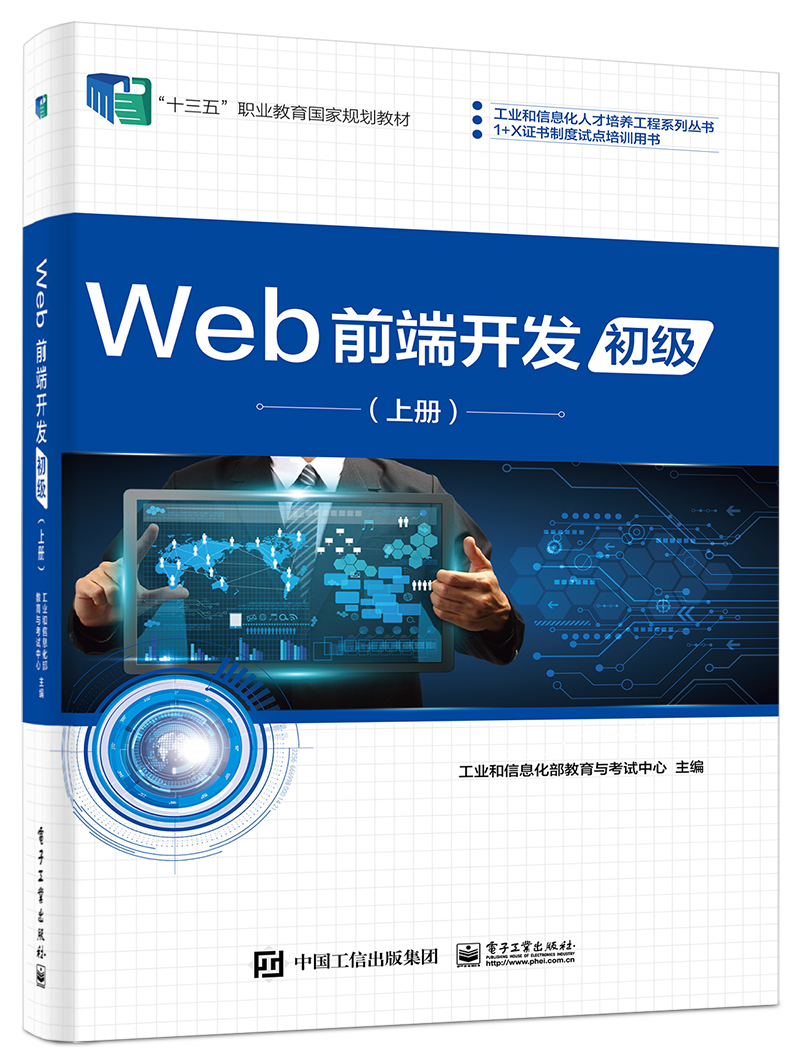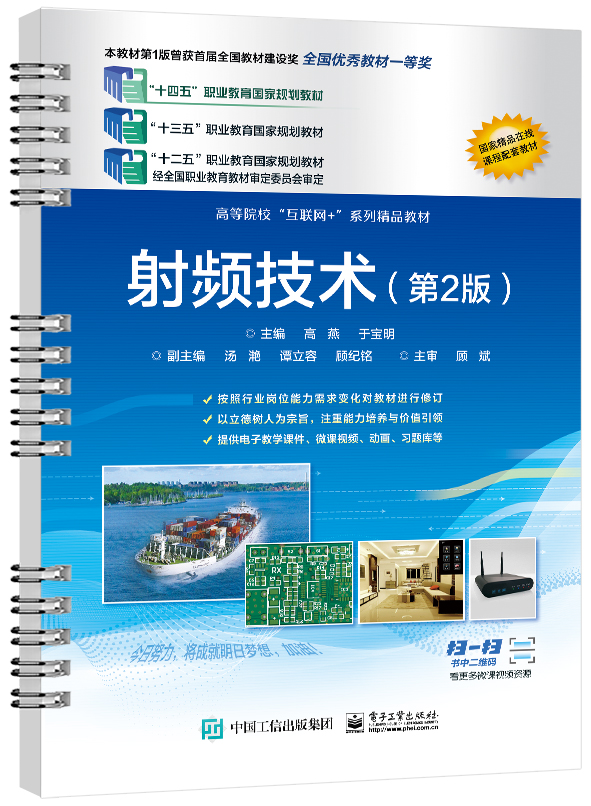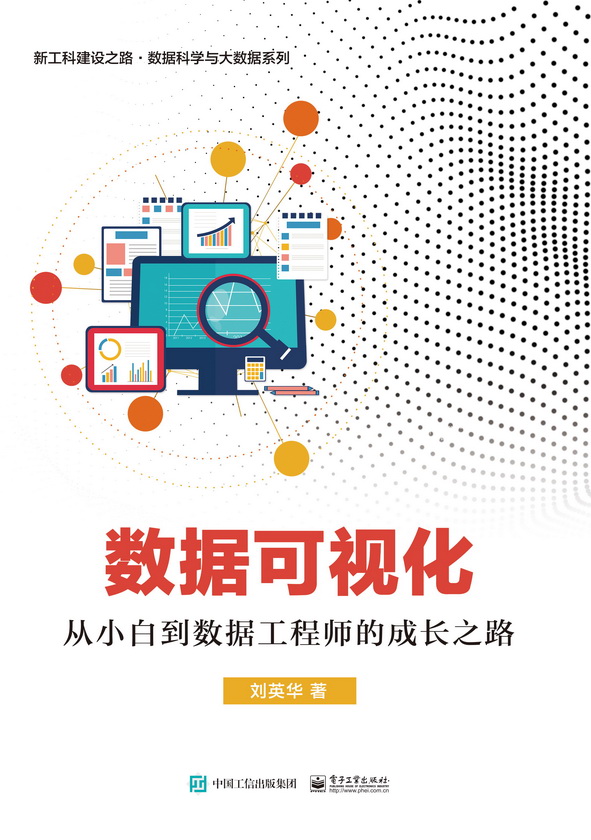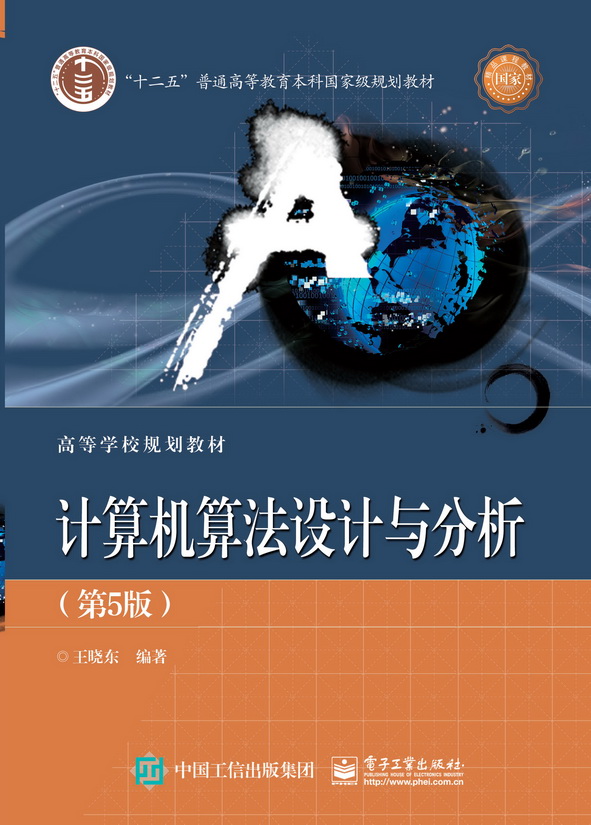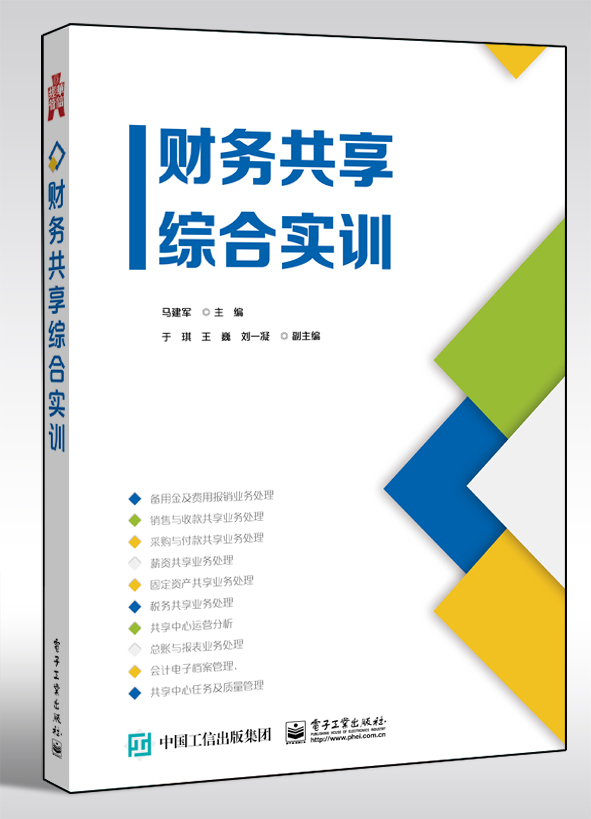国际商务(英文版·第3版)
作 译 者:(美)斯图尔特·沃尔,索诺·米诺卡
出 版 日 期:2012-06-01
出 版 社:电子工业出版社
维 护 人:
书 代 号:G0171430
I S B N:9787121171437
图书简介:
本书从全球的政治、经济、文化、法律、技术、伦理和生态等宏观的商业环境,到企业如何进行国际贸易、国际投资和国际金融业务,到企业国际经营战略的制定、国际人力资源管理、国际市场营销等,都有较为详细的论述。同时本书精选了大量实际的案例,把许多主要的经济、贸易和管理理论融入案例之中,用来解释我们所处的全球化商业经营环境和具体的国际商业经营实践,使理论的意义更加明确、更加容易理解。另外,本书教辅资料齐全,为教和学提供了诸多的便利。
定价 59.0
您的专属联系人更多

联系人:王二华
电话:010-88254532
邮箱:wangrh@phei.com.cn
-
配 套 资 源
本书资源
本书暂无资源会员上传本书资源
-
图 书 内 容
内容简介
本书从全球的政治、经济、文化、法律、技术、伦理和生态等宏观的商业环境,到企业如何进行国际贸易、国际投资和国际金融业务,到企业国际经营战略的制定、国际人力资源管理、国际市场营销等,都有较为详细的论述。同时本书精选了大量实际的案例,把许多主要的经济、贸易和管理理论融入案例之中,用来解释我们所处的全球化商业经营环境和具体的国际商业经营实践,使理论的意义更加明确、更加容易理解。另外,本书教辅资料齐全,为教和学提供了诸多的便利。图书详情
ISBN:9787121171437开 本:16开页 数:468字 数:819本书目录
Contents Preface:using this book Acknowledgements ADDreVlatIOns 1 Introduction to international business Introduction Patterns and trends in international business Globalisation The multinational enterprise(MNE) How important are the multinationals? Useful websites Useful key texts Other texts and sources Case studies 1.Dyson relocates production tO South-East Asla 1.2 Happy birthday,globalisation 1.3 How tO play the home advantage 1.4 Does a global approach benefit the company? 1.5 Competing in a globalised economy Boxes 1.1 Relative Unit Labour Costs(RULC) 1.2 Definitions of globalisation 1.3 Globalisation features 2 lnternatiOnaIiSatiOn process Introduction Export-based methods for internationalisation Non-equity-based methods for internationalisation Equity-based methods for internationalisation Whv invest abroad? Theoretical explanations Useful websites Useful key texts Other texts and sources Case studies 2.1 Helping inward fdi 2.2 Patents and the EU pharmaceuticals market 2.3 Legal process outsourcing in India 2.4 Market entry into China 2.5 The Japanese keiretsu 2.6 China versus South Korea Z.7 Toyota wlns support for its US operations 2.8 Daewoo moves into international agriculture 2.9 Internationalisation may not always deliver! Boxes 2.1 ‘Flat tax’regimes 2.2 Government policies,exporting and fdi 3 International business:theory and practice Introduction Gains from trade Sources of comparative and competitive advantage Trade and the world economy Barriers to trade Protectionist policies Regional trading arrangements Government policies and international business Internationalinstitutions and world trade The International Monetary Fundl(IMF) World Bank Useful websites Useful key texts Other texts and sources Case studies 3.1 Impacts of fleer trade 3.2 Intra-industry trade:Honda 3.3 High cost of anti-dumping tariffs 3.4 Harbours of resentment 3.5 WTo to rule on US import duties Boxes 3.1 Comparative advantage and opportunity cost 3.2 Gains from trade 3.3 Impacts of a tariff 3.4 Impacts of a subsidy 3.5 Customs Union:trade creation and trade diversion 3.6 Impacts of EU policies on farms and agri-businesses 3.7 IMF stabilisation programmes 3.8 WOrid Bank structural adj ustment and stabilisation 4 The political,legal,economic and technological environment Introduction Political environment Political risk The internationallegal environment Intellectual property rights Economic systems Economic variables and the business environment Technological environment Technology transfer Useful websites Useful key texts Other texts and sources Case studies 4.1 Chinese government and EU milk products 4.2 BMW after Rover 4.3 Tougher scrutiny of foreign takeovers in US 4.4 Intellectual property rights(IPR)in India:Novartis 4.5 Extending copyright 4.6 Intellectual property rights in China(IPR):Durex 4.7 Market influences on Wellcome share price 4.8 China’S capital markets begin to open 4.9 Finance chiefs take pessimistic view Boxes 4.1 EU directives and state aid 4.2 EU directives and data protection 4.3 Strategic patenting 4.4 Elasticity of demand 4.5 Creating or destroying j obs 5 InternationaI SOciOcuIluraI environment Introduction National cultural characteristics Cultural impacts on international business National,organisational and occupational cultures Strategies for developing intercultural competence Useful websites Useful key texts Other texts and sources Case studies 5.1 National culture and Japanese competitiveness 5.2 East meets West 5.3 Culture of communication breaks through traditional barriers 5.4 Corporate culture and Japanese competitiveness 5.5 Management gurus might rethink the Dutch approach 5.6 Challenges to cross-cultural team management 5.7 Corporate‘personality’has a big impact on business success Boxes 5.1 A clash of cultures 5.2 National and organisational cultural dimensions 6 International ethical and ecological environment Introduction Business ethics Ethics and the corp orate culture Different ethical positions International business ethics International eftorts to improve business ethics Ecological/environmental issues Global warming,‘carbon footprint’and tradable permits Useful websites Us eful key texts other texts and sources Case studies 6.1 The Body Shop 6.2 Ethics and profits 6.3 Bribery and international business 6.4 US groups in ethical standards push 6.5 Taxing and regulating smoking 6.6 Organic farming 6.7 Biofuels subsidies criticised 6.8 Prices‘no incentive’for a clean-up Boxes 6.1 An ethical dilemma 6.2 TI Corruption Perception Index 6.3 Environmental impacts,taxes and regulations 6.4 Stern Report and global warming 6.5 The EU Emissions Trading Scheme 7 International strategic issues IntrOductlOn Business strategy-ideas and concepts Choice of strategy Corporate strategy in a global economy International business and the value chain International business strategies International business strategies and political perspectives Institutional strategies and international business Techniques for strategic analysis International operations management and logistical strategies Useful websites Useful key texts Other texts and sorces Case studies 7.1 Sbtrategles in practice 7.2 Strategic mistakes at Citigroup 7.3 MNE strategies in the US market 7.4 US carmaking:political and economic imperatives 7.5 Daimler-Benz AG and Chrysler 7.6 Telematics and strategic choices 7.7 Game theory in actlon:designing the US airwaveS auction 7.8 Strategic scenario analysis:AMD versus Intel 7.9 Operations management system:Kahn Handicrafts Boxes 7.1 Mergers and acquisitions incentives 7.2 Two-firm zero-sum game 7.3 Lean production 7.4 Inventory(stock)costs and control 7.5 Economies of scope and the transport sector 8 International human resource management Introduction Human resource management function International human resource management(IHRM) International HRM approaches IHRM policies and practices Work practice in an international context Useful websites Useful key texts Other texts and sources Case studies 8.1 HRM and the external environment 8.2 Islamic culture and IHRM 8.3 Mindset of a Toyota manager revealed 8.4 Reward mechanisms in cross-cultural contexts 8.5 Flexible working and IHRM Boxes 8.1 Greek national culture and decentralisation of the IHRM function 9 International marketing Introduction The principal actlvmes of marketing International marketing Decision making and international marketing Market selection Market-entry strategies International marketing mix International marketing planning Useful websites Useful key texts 0ther texts and sources Case studies 9.1 Global rebranding of BP 9.2 A better burger thanks to data crunching 9.3 Variations in the international marketing mix 9.4 India’s new affluent consumers 9.5 Global brands 9.6 Lessons for marketers who face a hard sell 9.7 Love in a warm climate 9.8 Indian stores in search of drama Boxes 9.1 Market segmentation 9.2 Strategic pricing initiatives 9.3 Price elasticity of demand(PED)and revenue 9.4 Price discrimination 9.5 Promotion/advertising and demand 9.6 UK internet trends in 2007/08 10 International finance:theory and practice Introduction International financial markets The exchange rate International debt financing International equity markets Strategic financial risk management Accounting and financial decision making Major financial accounting statements The income statement The balance sheet Statement of changes in eq uity The cash flow statement Published accounts Differences of reporting and accounting approach in different countries Global accounting standards Corporate governance and international business Useful websites Useful key texts Other texts and sources Case studies 1O.1 SIV managers dig out their manuals 10.2 Seniority brings a false sense of security 10.3 Sum of the parts 10.4 Spate of downgrades raises fears 10.5 Risk needs a human touch 10.6‘To converge to a single set of standards is now crucial’ Boxes 1O.1 Types of exchange rate 10.2 The Structured Investment Vehicle(SIV) 10.3 Financlal instrUments and Internatlonal trade 10.4 The Sarbanes-Oxley Act 2002 Answers and responses Index展开前 言
我们处在一个经济全球化的时代。经济全球化是指以市场经济为基础,以先进科技和生产力为手段,以发达国家为主导,以最大利润和经济效益为目标,通过贸易、分工、投资和跨国公司,实现世界各国市场和经济相互融合的过程,它是全球化的基础和重要组成部分。 进入21世纪,经济全球化进一步向广度和深度推进,而国际商务是经济全球化的载体。今天的国际商务已渗透到了世界的每一个角落。可以说绝大多数的北美家庭都用过或正在使用中国出口的产品,而中国人对诸如波音飞机、可口可乐、麦当劳、肯德基等也早已耳熟能详。 中国是经济全球化重要的参与者和推动者。现在中国是世界第一出口大国和第二进口大国,2010年中国进出口贸易额达29 727.6亿美元。其中,出口15 779.3亿美元,进口13 948.3亿美元。中国是吸引FDI最多的新兴市场,同时中国企业也越来越多地向海外投资。2010年,中国对外投资年流量已上升到世界第五位,中国对外投资与吸引外资的比例预计将在未来10年超过1∶1。 中国的国内市场已是国际市场的重要组成部分。作为经济全球化时代的中国职业经理人,具有全球化视野和全球化经营理念是必然的要求,同时需要掌握国际商务管理的知识。全球化经营理念不是大公司的专利,中小企业同样可以而且需要进行全球化经营。 与国内商务相比,国际商务活动所面临的市场环境更加复杂,业务活动所受到的影响因素和不可控制因素更多,经营风险更大,涉及资金更多,一旦决策失误,损失也更大,因此国际商务活动对企业经营能力的要求更高。 国际商务管理是一门建立在经济学、管理学、国际贸易理论和实务、商务沟通理论、市场营销学等一系列经济、管理理论基础之上的应用学科。国际商务管理着重研究企业如何到国际上去开展业务以及如何对其进行管理,同时也是将管理的各个方面运用到国际企业中去的一种可操作的方法。 因此,国际商务是MBA和MIB(Master of International Business, 国际商务硕士)的重要课程。通过国际商务课程的学习,使MBA学生了解当前商业经营的国际商务环境,开阔视野、提升思维、立足中国、胸怀全球,成为成功的经济全球化时代的国际化经营人才。 国际商务课程需要高质量的教材和参考书。应该说,现在国内外国际商务方面的书籍是非常多的,但是选择一本适合需求的也需要具有一双慧眼。 本书具有以下特点:首先,本书涉猎知识广泛,从全球的政治、经济、文化、法律、技术、伦理和生态等宏观的商业环境,到企业如何进行国际贸易、国际投资和国际金融业务,到企业国际经营战略的制定、国际人力资源管理、国际市场营销等,都有较为详细的论述。其次,本书精选了大量实际的案例,把许多主要的经济、贸易和管理理论融入案例之中,用来解释我们所处的全球化商业经营环境和具体的国际商业经营实践,使理论的意义更加明确,更加容易理解。最后,本书为教和学提供了诸多的便利。本书通过网站提供了大量的学习资源,让学生不断地复习和巩固已学的知识,同时通过各种市场进入战略项目、讨论题、小组课题、在线课题等多角度强化所学理论和知识的实际应用。该书也为教师提供了可下载的教师手册、教学PPT、题库等教学资源,为教师的教学实施提供了极大的便利。 本书主要内容包括:国际商务导论;企业经营国际化的进程;国际商务的理论与实践;国际商务的政治、法律、经济和技术环境;国际社会文化环境;国际伦理和生态环境;国际商务战略;国际人力资源管理;国际市场营销、国际金融的理论与实践等。 本书适合MBA学生、MIB学生、高级经理和高层进修学员、管理和经济学科硕士生及高年级本科生、政府机构涉及国际经贸的人员以及相关研究人员使用。展开作者简介
本书暂无作者简介 -
样 章 试 读本书暂无样章试读!
-
图 书 评 价 我要评论
